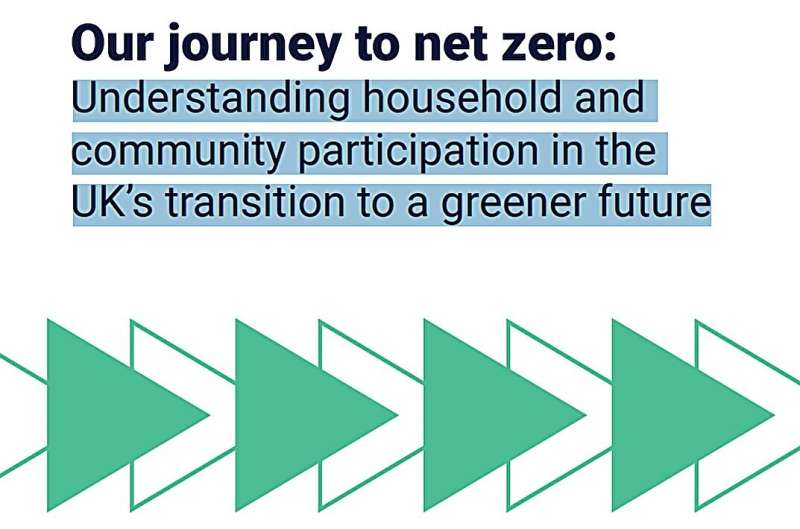Net zero policy risks are making the poor poorer, says UK report
The poorest 40% of U.K. households will be most impacted by existing net zero policies, leading to further deprivation and exclusion, new research reveals.
Researchers at the University of York have contributed to a new report from The Young Foundation which explores how the transition to net zero could affect households and communities. It calls for environmental policies to recognize existing inequalities to avoid further deprivation and exclusion, and ensure a successful transition to a greener world.
“We are in the middle of a climate crisis and net zero changes are an essential part of this,” says Carolyn Snell, Professor of Social Policy at the School for Business and Society, University of York. “They are already shaping how we live—but if we go too far down this road without supporting those in most need we will leave them behind.”
Inequalities
Changes to home energy include the installation of home smart systems and the introduction of new technology such as heat pumps. The research shows that people on low incomes are unlikely to be able to afford to make these changes on their own.
Professor Snell said, “Not being able to engage with these changes means that ultimately some parts of the population will be left with outdated, expensive to run houses, actually worsening their circumstances.
“Net zero policies need to recognize existing inequalities and respond to them—for example—policies should remove the financial barriers that prevent low income households from participating in the transition through new financial support packages.”
Community engagement
The report also calls for more community engagement from policymakers. Working with local communities to understand their needs and concerns is a longstanding element of environmental policymaking, which could be applied more substantially in relation to net zero.
“When we think about transition to a greener future, we often think about the scientific, industrial and technological solutions that need to be put in place to manage the change,” says Kelli Kennedy, a York researcher on the project. “But this is a human transition that requires participation from individuals, households and communities, and this means involving people at all stages of the journey, and recognizing that we’re not all starting from a level playing field.”
More information:
Our journey to net zero: Understanding household and community participation in the UK’s transition to a greener future. youngfoundation.b-cdn.net/wp-c … uary-2024.pdf?x59628
Citation:
Net zero policy risks are making the poor poorer, says UK report (2024, February 21)
retrieved 21 February 2024
from https://phys.org/news/2024-02-net-policy-poor-poorer-uk.html
This document is subject to copyright. Apart from any fair dealing for the purpose of private study or research, no
part may be reproduced without the written permission. The content is provided for information purposes only.

The poorest 40% of U.K. households will be most impacted by existing net zero policies, leading to further deprivation and exclusion, new research reveals.
Researchers at the University of York have contributed to a new report from The Young Foundation which explores how the transition to net zero could affect households and communities. It calls for environmental policies to recognize existing inequalities to avoid further deprivation and exclusion, and ensure a successful transition to a greener world.
“We are in the middle of a climate crisis and net zero changes are an essential part of this,” says Carolyn Snell, Professor of Social Policy at the School for Business and Society, University of York. “They are already shaping how we live—but if we go too far down this road without supporting those in most need we will leave them behind.”
Inequalities
Changes to home energy include the installation of home smart systems and the introduction of new technology such as heat pumps. The research shows that people on low incomes are unlikely to be able to afford to make these changes on their own.
Professor Snell said, “Not being able to engage with these changes means that ultimately some parts of the population will be left with outdated, expensive to run houses, actually worsening their circumstances.
“Net zero policies need to recognize existing inequalities and respond to them—for example—policies should remove the financial barriers that prevent low income households from participating in the transition through new financial support packages.”
Community engagement
The report also calls for more community engagement from policymakers. Working with local communities to understand their needs and concerns is a longstanding element of environmental policymaking, which could be applied more substantially in relation to net zero.
“When we think about transition to a greener future, we often think about the scientific, industrial and technological solutions that need to be put in place to manage the change,” says Kelli Kennedy, a York researcher on the project. “But this is a human transition that requires participation from individuals, households and communities, and this means involving people at all stages of the journey, and recognizing that we’re not all starting from a level playing field.”
More information:
Our journey to net zero: Understanding household and community participation in the UK’s transition to a greener future. youngfoundation.b-cdn.net/wp-c … uary-2024.pdf?x59628
Citation:
Net zero policy risks are making the poor poorer, says UK report (2024, February 21)
retrieved 21 February 2024
from https://phys.org/news/2024-02-net-policy-poor-poorer-uk.html
This document is subject to copyright. Apart from any fair dealing for the purpose of private study or research, no
part may be reproduced without the written permission. The content is provided for information purposes only.
